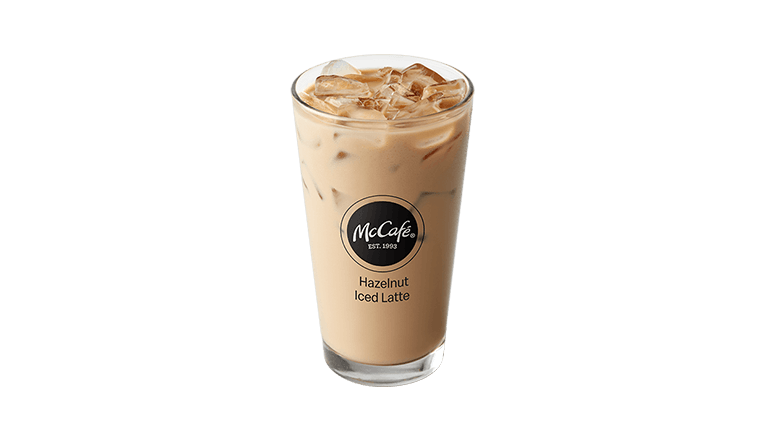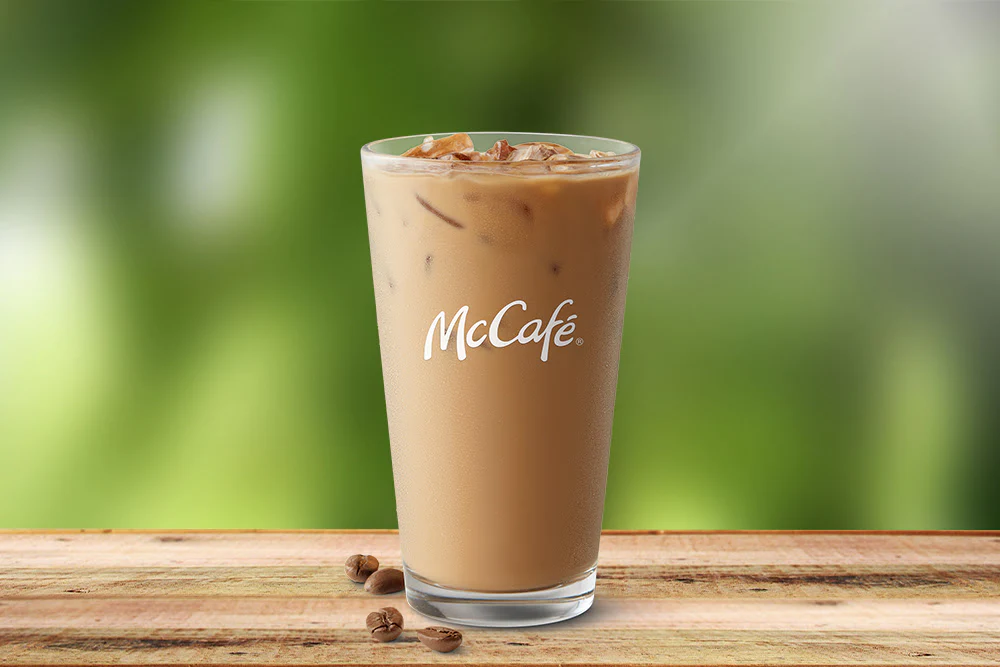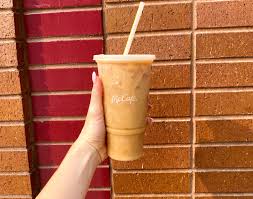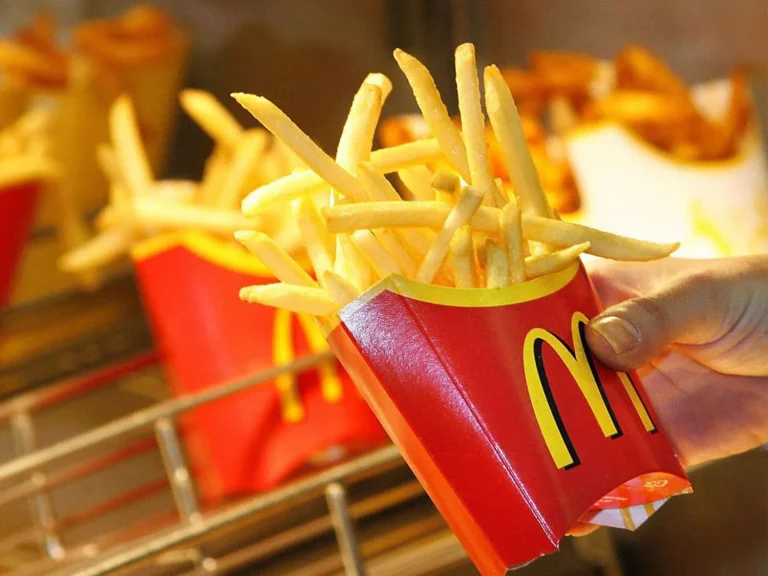How Much Caffeine In McDonalds Iced Coffee Medium?
Are You Curious To Know About How Much Caffeine In McDonalds Iced Coffee Medium? You may notice many sipping at McDonalds iced coffee and questioning just how much buzz it brings. Well, wonder no more because I’m spilling the beans on the stimulating stats of a medium Micky D’s cold brew and settling in.
Then get ready for this caffeinating revelation – one 12-ounce medium coffee packs about 133 milligrams of caffeine, which is more than enough pep to power you through the afternoon. Next time you need a refreshing pick-me-up on the go, an iced coffee from McDonald’s could be your solution to feeling revived without the jitters of too much Joe.
Table of Contents
Caffeine Amount in a Medium Iced Coffee

As you likely know from all those pick-me-ups, one McDonald’s medium iced coffee packs about 133 milligrams of caffeine. That amount may seem middling, but it’s enough to wake you up without leaving you too wired. All that energy also comes in a 12-ounce drink, meaning a satisfying yet not-so-overwhelming boost.
After a sleepy start to the day, just one of these cooling coffees makes me feel awake and alert to take on tasks. With under 150mg, you’ll stay stimulated without potential side effects like anxiety or jitters some higher doses can bring on.
Effects of Caffeine on the Body
| Physiological Effect | Description |
| Caffeine as a Stimulant | Caffeine stimulates the central nervous system, enhancing alertness. |
| Release of Adrenaline | Signals the brain to release adrenaline and other hormones. |
| Increased Cardiovascular Activity | Raises heart rate, blood pressure, and respiration. |
| Adenosine Blockage | Blocks adenosine receptors in the brain, promoting wakefulness and clarity. |
| Energy Boost | Enhances energy levels, focus, and mood for improved performance. |
| Daily Safety Limit | Up to 400 mg of caffeine daily is considered safe for most adults. |
| Signs to Cut Back | Reduce intake if experiencing jitters or insomnia. |
Compared to Other Coffee Drinks
| Beverage | Size (oz) | Caffeine Content (mg) | Calories | Notes |
| McDonald’s Iced Coffee | 12 | 133 | 1-5 | Low-calorie option compared to sugary drinks. |
| Starbucks Grande Cold Brew | 12 | 130 | 0-5 | Similar caffeine content to McDonald’s iced coffee. |
| Homemade Hot Brew | 12 | ~160 | Varies | Typically brewed stronger than store-bought options. |
| Coca-Cola | 12 | 34 | 140 | Significantly lower caffeine than coffee options. |
Individual Differences in Caffeine Sensitivity

While 133mg provides an excellent lift for many, we all react differently based on factors like tolerance, metabolism, weight and genetics. Some find they need 200mg for the same effect as just 100mg. Rapid metabolizers can clear caffeine from their systems in at least three hours versus six hours for slower metabolizers.
So, keeping a daily diary of your energy levels, sleep, and symptoms can help you gauge your unique sensitivity over time. Take note of any adverse reactions like headaches too – it may mean easing up on the caffeine. The only accurate guide is listening to how your body responds, to get the benefits without the drawbacks.
Benefits of Iced Coffee over Hot Coffee
| Advantage | Description |
| Caffeine and Hydration | Iced coffee combines caffeine with hydration, making it a refreshing choice on hot days. |
| Smooth Flavor | Cold brew extraction results in a smoother flavor profile with reduced acidity and bitterness. |
| Gradual Caffeine Absorption | The cold temperature slows caffeine absorption, providing a more gradual energy boost. |
| Higher Antioxidant Levels | Chilling coffee protects its natural oils and enhances antioxidant levels compared to hot brewing. |
| Year-Round Convenience | Iced coffee can be enjoyed anytime, providing caffeine convenience regardless of the season. |
Factors Affecting Caffeine Levels
| Factor | Description |
| Standard Caffeine Level | The standard medium iced coffee contains approximately 133 mg of caffeine. |
| Roasting Level | Darker roasts may have lower caffeine content, while lighter roasts often retain more caffeine. |
| Bean Origin | Different coffee beans have varying caffeine levels; some regions produce beans with higher concentrations. |
| Brewing Time | Longer brewing times can increase caffeine extraction, affecting the final caffeine content. |
| Water Temperature | Hotter water typically extracts more caffeine; iced coffee uses cold water, resulting in lower extraction. |
| Location Variations | Individual McDonald’s locations m |
Variations by Flavor (e.g., French Vanilla, Caramel)

| Flavored Coffee Type | Caffeine Content | Additional Notes |
| French Vanilla | Approximately 110-130 mg per medium | Flavoring syrups may dilute caffeine concentration with added sugars. |
| Caramel | Approximately 110-130 mg per medium | Similar dilution effect from syrups, maintaining flavor while impacting caffeine. |
| Seasonal Options (Fall/Winter) | May contain lower mg due to mix-ins | Seasonal flavors could lead to even lower caffeine levels depending on additional ingredients. |
| Plain Hot/Iced Coffee | Approximately 133 mg per medium | Standard caffeine level unaffected by flavor additives. |
Regular vs. Decaf Iced Coffee Options
Thankfully, those who cut back can get decaf versions of medium-iced coffee. While zero caffeine is impossible, these minimally processed beans contain just 3mg of the stimulant per 12oz serving.
That infinitesimal intake provides the taste experience without any meaningful physiological effects. Suitable as afternoon sippers for pregnant and nursing moms or people with caffeine sensitivity, decaf lets you stay cosy without being kept up at night. Just double-check the signs to avoid regular mistakes.
Nutritional Information Beyond Caffeine
Beyond its buzzing benefits, McDonald’s medium iced coffee boasts minimal additions that keep calorie and sugar counts low. Its regular coffee has only five calories, while whitened varieties may climb to 15 calories or less with cream.
There are no added sugars either; sweetened versions use just 1-2 grams of sugar from natural flavours. Antioxidants, minerals, and riboflavin provide further health benefits in every cooling cup. Overall, it is an intelligent beverage addition for those focusing on clean caffeine sources.
Health Impacts of Caffeine Consumption

| Caffeine Intake | Daily Amount | Benefits | Considerations |
| Moderate Intake | Under 400 mg | – Improved focus- Enhanced mood- Better workout performance- Reduced disease risk factors | – May interfere with sleep- Can cause anxiety |
| Pregnant Women | Under 200 mg | – Safety for both mother and child | – Higher sensitivity to caffeine |
| Sources Recommended | Natural sources only | – Coffee- Tea | – Avoid sugary sodas or energy drinks |
Recommended Daily Caffeine Intake
Most major health agencies claim up to 400mg of caffeine intake daily is generally safe for healthy, non-pregnant adults. The US Food and Drug Administration sets a general limit at this level. However, personal tolerance varies, so some feel best consuming less.
Factors like weight, stress levels and medications determine ideal amounts, so start low and increase gradually to see how your system responds. For pregnant women, recommended max is 200mg daily to avoid potential risks to the baby’s development. Moderate, intentional caffeine allows for reaping benefits without harming sleep or wellness.
McDonald’s vs. Other Fast Food Iced Coffees (Caffeine Content)
| Brand | Drink Size | Caffeine Content |
| McDonald’s | Medium (12oz) | 133 mg |
| Starbucks | Grande (12oz) | 130 mg |
| Tim Hortons | Iced Capp (12oz) | 120 mg |
| Dunkin‘ | Medium (14oz) | 135 mg |
Customization Options (e.g., Adding Espresso Shots)

While their standard medium serves 133mg just right for many, you have tweaking options if you need an extra jolt. Asking your friendly barista nicely about adding a single or double shot of espresso ratchets the buzz significantly.
Each 1oz shot carries around 70-100mg depending on how it’s brewed, so you’re looking at a maximum of 200-300mg potential per drink. These power-ups come at an upcharge but let you regulate your wake-up juice needs. There are also lighter customizations, like substituting dairy or sweeteners.
How McDonald’s Sources Their Coffee

It’s no drip dreck – McDonald’s uses quality coffee beans in all their hot and chilled cups. Sourced ethically and sustainably from Rainforest Alliance-certified family farms, beans vary based on seasonal crop forecasts.
Medium roast profiles allow tasting all the complex nuances of chocolatey and nutty notes while satisfying a caffeine craving. The unique cold brew process extracts more antioxidants and smoother flavour from a 14-18 hour steeping. So whether you whip up the concentrate at home or drive-thru for a ready-poured cup, rest assured it’s expertly extracted caffeinating coffee.
FAQs
How much caffeine is in a medium iced coffee from McDonald’s?
A 12 oz McDonald’s iced coffee contains approximately 133mg of caffeine. This moderate amount provides a nice energy boost to help you power through your day.
Is this caffeine amount similar to that of other fast-food coffee chains?
Yes, the 133mg of caffeine in a medium McDonald’s iced coffee is on par with amounts found in equivalent-sized drinks from popular chains like Starbucks, Dunkin’, and Tim Hortons, falling within the 130-150mg range.
Can I customize my order to increase the caffeine?
You can ask your barista to add one or two espresso shots to your iced coffee, boosting the caffeine by around 70-100mg per 30ml shot. Just be prepared for a more robust taste profile, too!
How will this caffeine affect my energy levels?
The 133mg caffeine stimulates your central nervous system and raises alertness levels for 2-4 hours by blocking adenosine receptors in the brain. You’ll feel more energized, focused, and possibly even less sleepy.
What’s the recommended daily caffeine intake limit?
While caffeine can have health benefits when consumed moderately, most significant organizations advise consuming no more than 300-400mg daily for adults. Pregnant women should aim to consume less than 200mg daily.
Conclusion
In conclusion, you can feel confident that a medium iced coffee from McDonald’s gives you just the right amount of caffeine to feel energized without causing issues with your sleep or overall caffeine intake for the day.
The approximately 133 mg per medium iced coffee packs less caffeine than many speciality coffee shop drinks. Yet it provides a real boost to help you push through that mid-afternoon slump. So next time two o’clock rolls around, and you’re dragging, do yourself a favour and grab a medium iced coffee.
The caffeine will perk you up and get you going without making you jittery or keeping you up at night. In moderation, McDonald’s iced coffee is a delicious way to boost your energy levels naturally with clean caffeine. Enjoy yours and feel the boost!







